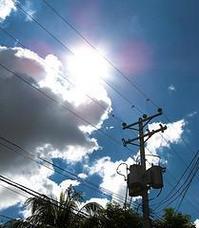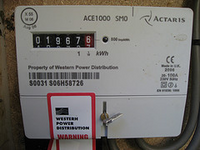Can power factor correction devices lower your electric bill?
I realize this note may very well be in left field, but I'm curious about a product I saw at the home show called a "Harmonic Capacitor" for residential installation. The claim is that it reduces your electrical usage by up to 20 percent.
If this product really is that good, and electricity consumption really can be reduced, then I would think a city-wide rollout of such a product would be a good thing. I keep on coming back to the saying, "If it sounds too good to be true, then it probably is."
- Chris Ann Arbor
You bring up a couple of very good questions about the claims made about this product. One company even claims a harmonic capacitor can decrease or eliminate your electrical bill.

Photo by dbgg1979
The unit is essentially made up of capacitors that are hooked up to a circuit panel and claim to reduce the power generated from your utility company. Although there are other units for commercial and industrial usage, we only researched the claims for the residential. They are said to reduce the amount of power by storing electricity otherwise lost from the motors in your home such as washing machines, furnace blower motors, refrigerators and air conditioners. The cost for the unit is approximately $300, plus installation.
The term used to describe the efficiency of electricity that comes from the utility company is "power factor." In other words, the higher your power factor, the more effective your home's electricity will be. Other than the claim that your energy bill will be reduced significantly with a harmonic capacitor, this is one of the biggest differences between the truth and the product claims in our research.
According to the National Institute of Standards and Technology (NIST), the U.S. Department of Commerce Technical Note 1654, “Electric Energy Savings, Power Factors, and Carbon Footprints: A Primer,” states that the normal residential power factor for these motors may not be very low because they are operated only intermittently. If this device actually increased the power factor, the utility company would not have to supply as much current when certain electrical appliances were in operation. Ironically, this will not decrease the homeowner's electric bill. The reason is due to the fact that with the power factor increasing and the current power decreasing, the electrical formula for billable kilowatt hour, “I x V x PF,” remains relatively the same.
In an email conversation with James R. Korona, PE, supervising engineer with DTE Energy, and an interview with Juan Estillos, electrical engineer EE, master electrician and owner of LaCasa Electric Novi, both experts agree that the power factor for residential services are typically 95 percent, not the claimed factor of .77 or less that many of these products claim. Since the power factor rating of many of the motors used in the home are relatively high, there is no need for any additional correction. This reactive power used by these devices is already relatively small. Since residents are only billed for kilowatts (the real power used, which is measured on the billing meter not the reactive power they consume) this will result in very little or no savings.

Photo by Kai Hendry
According to NIST, there could be a possible savings for the harmonic capacitors in use with central air conditioners. In this scenario, the approximate calculations was less than 0.05 ohms. That being said the energy savings drawn by the motor will be approximately 52.8 watt-hours per day. If your residential electrical charge is 20 cents per kilowatt-hour and you run your air conditioner 12 hours a day for 6 months, the annual savings would only be approximately $1.80.
When you compare the potential savings with the actual cost of the harmonic capacitor plus installation charges, it doesn't appear to make sense to spend your money on one of these units. You could easily save more energy simply by turning off lights when they aren't in use and using more energy-efficient light bulbs.
Paul is a State of Michigan Licensed Builder. Paul serves as President and founding member of Nationally franchised HandyPro Handyman Service, servicing Washtenaw, Wayne and Oakland Counties. Listen to Paul every Saturday at 11:00am on “It’s Your Home, Let’s Talk About It” WAAM Talk 1600AM. Email questions or comments to kpaul@handypro.com


Comments
Technojunkie
Thu, Jun 3, 2010 : 8:30 a.m.
Desktop computer power supplies, good ones anyways, have had PFC ratings upped from ~70% to ~99% for several years now. Certainly all Energy Star rated power supplies do. They do seem to help keep nearby lamps from blinking when firing up the PC. You'll get your electric bill savings from the higher efficiency in the AC to DC conversion of Energy Star certified power supplies rather than the more efficient PFC though. Fan exhaust from old power supplies can feel like a hair dryer set on low whereas new ones usually run cool.
clownfish
Thu, Jun 3, 2010 : 7:29 a.m.
Now THAT is good reporting!